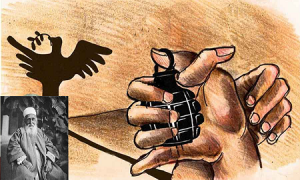Abdul Baha has introduced Islam as the religion of sword and violence while the holy war has basically legislated in Islam for defending and removing sedition. Additionally, Baha’ism which is blackmailing against Islam and proselytize the false peace has as if forgotten that it is the most criminal!
Baha’ism claimed for the holy prophet’s (P.H.) sword: “That sword was conquering the castles made of stone and lime and this sword is conquering the castles of hearts. That sword was narrating the divine quarrel; this sword is narrating the eternal divine mercy. That sword was separating but this sword is uniting…[۱]”
The Answer:
۱-Contrary to Baha’ism claim, the holy prophet’s (P.H.) sword hasn’t been used for the compulsory expansion of Islam and his holy was had been done to defend and remove sedition and corruption. Basically, the philosophies of holy war in Islam are as follows:
A)To defend Muslims or the oppressed:
“أُذِنَ لِلَّذِينَ يُقاتَلُونَ بِأَنَّهُمْ ظُلِمُوا” (حج/۳۹)
“To those against whom war is made, they are wronged: and verily, Allah is most powerful for their aid.” [Al-Hajj/39]
B)To destroy sedition and corruption:
“قاتِلُوهُمْ حَتَّى لا تَكُونَ فِتْنَةٌ” (انفال/۳۹)
“And fight them on until there is no more tumult or oppression…” [Al-Anfal/39]
C)To preserve the monotheistic centers:
“لَوْ لا دَفْعُ اللَّهِ النَّاسَ بَعْضَهُمْ بِبَعْضٍ لَهُدِّمَتْ صَوامِعُ وَ بِيَعٌ وَ صَلَواتٌ وَ مَساجِدُ يُذْکَرُ فيهَا اسْمُ اللَّهِ کَثيراً ” (حج/۴۰)
“[They are] those who have been expelled from their homes in defiance of right, -[for no cause] except that they say, “Our Lord is Allah”. Did not Allah check one set of people by means of another, there would surely have been pulled down monasteries, churches, synagogues, and mosques, in which the name of Allah is commemorated in abundant measure. Allah will certainly aid those who aid his [cause]; -for verily Allah is full of Strength Exalted in Might, [able to enforce His Will].” [Al-Hajj/40]
D) Defending the establishment of divine commandments and limits:
“قاتِلُوا الَّذِينَ لا يُؤْمِنُونَ بِاللَّهِ وَ لا بِالْيَوْمِ الْآخِرِ وَ لا يُحَرِّمُونَ ما حَرَّمَ اللَّهُ وَ رَسُولُهُ وَ لا يَدِينُونَ دِينَ الْحَقِّ” (توبه/۲۹)
“Fight those who believe not in Allah nor the Last Day, nor hold that forbidden which hath been forbidden by Allah and His Messenger, nor acknowledge the religion of Truth, [even if they are] of the People of the Book, until they pay the Jizya with willing submission, and fell themselves subdued.” [Al-Toubah/29]
Yes, not only the holy prophet (P.H.) didn’t cause people to turn to Islam using the force of sword, but also compulsion in religion is an impossible issue because religion is a cordial affair and people’s hearts can’t be changed compulsorily.
۲) The verse narrated by Abdul Baha who is claiming for chastity[2] has been narrated by the holy Quran and related to the battlefield; that is, where the unbelievers have stood against you and are going to kill you. Fight firmly and not merely kill the one who is against your belief. As the verse says:
“فَاِذا لَقَیْتُم”
۳) Abdul Baha has introduced his father’s creed as the creed of peace while he has defined the aim of his so-called prophetic mission as fighting with the enemies of Baha’ism.
“قد جعله الله نوراً للموحّدین و ناراً للمشرکین”[۳]
As a matter of fact, using violence against the opponents is an intellectual and practical principle in Baha’ism as the self-proclaimed prophet of Baha’ism was one of the heads of terroristic movement of Baha’ism in Iran. He was even killing his opponents in Iraq even after being exiled.[4]
[۱] Tarazullah Samandari, Divine level, the Baha’i library, Vol. 1, p. 362.
[۲] Refer to Abbas Effendi, Mofavezat, Netherland: Breil publishing house, 1908 A.D., pp. 129-130,
[۳] Hussein Ali Nouri, the Highest pen works, the electronic copy, Vol. 2, p. 89.
[۴] Refer to: Eziyyeh Nouri, Tanbihunnaemin, the faithful of Bayan, the electronic copy, pp. 11-12.






